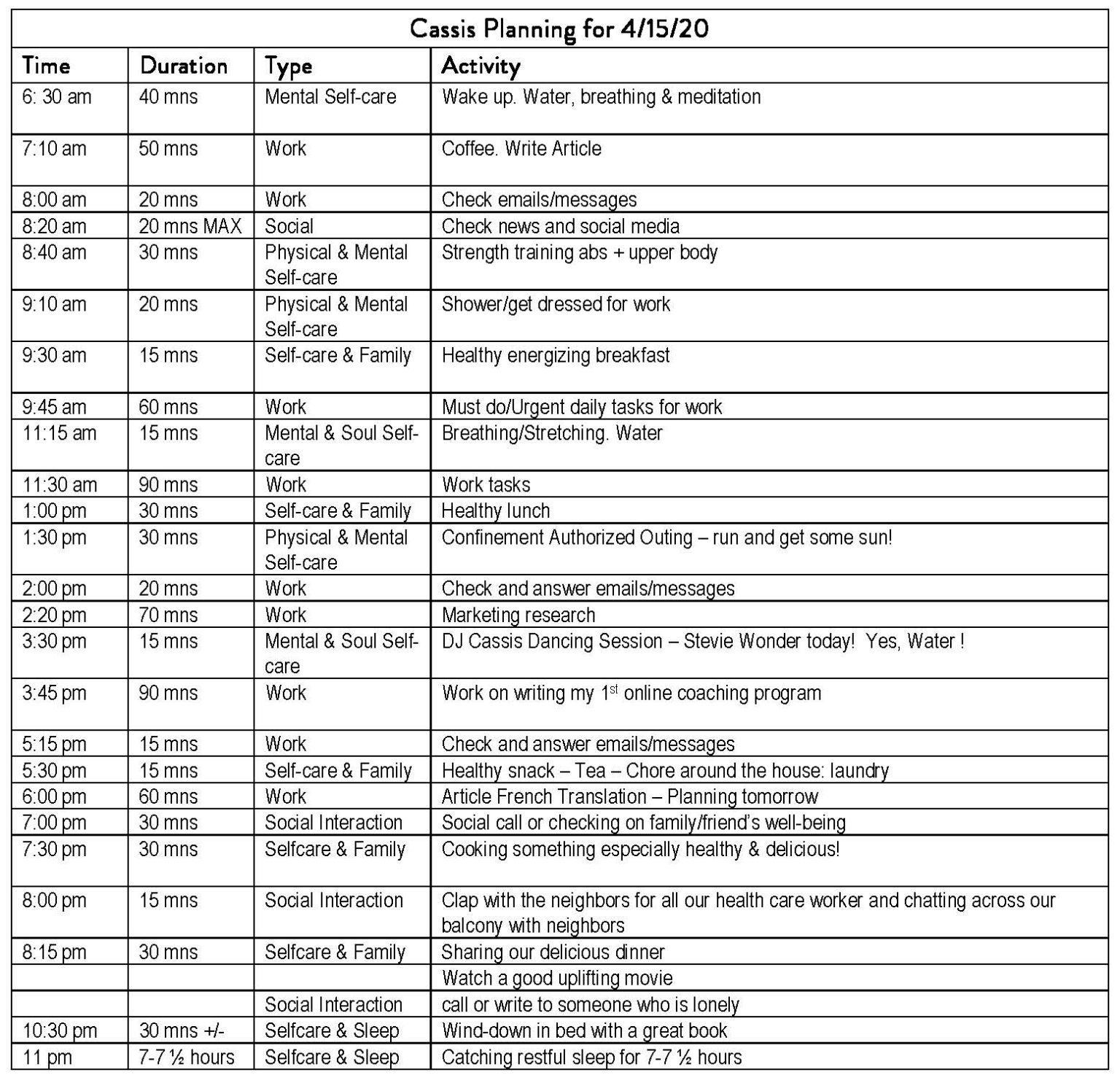Most of you, deemed non-essential workers, have suddenly been sent home, while being requested to keep working.
And if you are used to working alongside your coworkers, mobilized by workplace dynamism, you may find it hard to adjust. Sure you may have worked at home when sick a few days in the year, but this prolonged confinement may prove more challenging.
I have worked from home since 2001, right after 9/11 when the towers fell in New York City. At the time, I worked at a small direct marketing agency.
The week following that terrible day, I was told by my boss that he could not afford to pay me for the next 6 months. He gave me the choice to work without pay for 6 months. But I simply could not afford it.
Having contemplated the idea to lead my own agency, those considerations were put on fast track! I wrote down a plan with what was needed logistically to work from home.
In a matter of days, I opened up my company and started to work from my living room. Over the next 15 years, I led that first business’ growth through obstacles, setbacks, wins and varying workflow.
The consequences on my health and life sent me on several journeys to support my physical and mental health. I also wanted to create more balance between my work and personal life. And later, that is how my personal coaching programs for Healthy Work Warriors were born.
Today, it is only natural for me to offer my help to those of you who are feeling confused and unfocused right now.
I know I do not have all the answers as each household’s situation is very different.
Some are employees, some are managers, some are executives, like myself, are entrepreneurs.
Some are under financial pressure, some fear for the future, some are more secure on that front.
Some are alone at home, some are couples with small kids or teenagers, and others are single-parents.

No matter what your situation may be, I hope what follows will give you ideas that will make your life and work at home easier.
1. Time management: Planning work and life is the foundation
At home, the lines between work and life can quickly get blurred, especially since we are today facing unusual circumstances with confinement. It an be difficult to not get lost in the myriad of unknowns the coronavirus global pandemic is raising.
If you are alone at home, you may find it hard not to spend time seeking news or get sucked in the vortex of the internet to feel connected to the rest of the world. Incorporating optimal habits to handle your time will help you keep organized and productive.
Parents are faced with the additional challenge to home school, care for children and find the space and time to get work done. Scheduling needs to be negotiated between parents. It should include the kids if they are old enough to understand.
=> On Sunday evening, list and note down in your agenda your daily routines or prepare a family planning with everyone’s responsibilities: work, self-care, play and time for family and social interactions.
This will help maintain a sense of stability and instill discipline, especially since working from home may be extended for many.
If you are feeling overwhelmed about how to start, the next points may bring some ideas on freeing time by detoxing your media usage, using productive habits and supporting yourself and your loved ones.
2. Plan checking your work emails and messages and schedule your calls
When you get down to it, most emails, phone and text messages you receive are not emergencies. Yet, you may be checking them constantly, feeling like you need to stay on top, worrying you might miss something crucial.
So you navigate between checking the email that just got to your inbox, you hear the sound of that text arriving, and get distracted by a phone call. I want to encourage you to stop being a slave to your devices.
=> Only answer planned calls & messages from work. Schedule your work and personal call times in your planner. Allow ample time in case the conversation slides.
Set your inbox to receive emails at larger intervals of time. At the very least, leave your inbox closed while you are working on a task. I check my emails and text/phone messages 3 times a day. Apportion 15-30 mns depending on workload and your communication level and style.
=> Schedule in your planner set times for your work emails & messages daily checking and answering.
3. Schedule your social media time to make room in your life
The main reason most companies shy away from letting their employees work remotely is their fear that productivity will go down. Today, they have no choice but to trust that work will get done.
Yet, for some people distractions are indeed more difficult to avoid. And right now, it seems we really have a hard time staying away from interactions and notifications coming in from all directions.
In a once-in-a-lifetime context, it can be hard to not get sucked into the social media black hole and waste away hours. Coworkers, family, friends, coronavirus news.
Being constantly online, following the news, connecting with just about anyone you know is creating a huge emotional upheaval of anxiety and stress that makes it hard to focus. It is a lot of stressful news and energy coming your way!
The Coronavirus is moving fast, but not that fast. You are not going to miss anything major if you spend half a day without those interactions. So protect your mental health and gain some breathing room to help you focus!
=> Schedule your news & social media usage, and turn off instant notifications. Check the news only once a day of you can!
4. Schedule a single task or activity at a time, instead of multitasking
Now that you have eliminated some time wasters, it’s time to plan your personal and work activities. Give them a reasonable amount of time.
If you are one of these folks who think they are super productive because you work on your marketing report, while overseeing your daughter’s schoolwork, I’ve got news for you! Your performance is subpar from single taskers, and by far!
Many studies have now shown that multitasking makes you not only less productive and creative than single taskers, it affects the quality of your work and it is also bad for your brain:
- Switching between two tasks back and forth makes you waste 40% of your time and maybe more.
- Since your brain is busy trying to make sense of what you are doing, it cannot focus on each activity. Multitasking slows you down as your brain is trying to filter each context.
- And of course, you cannot really concentrate and find the flow needed to give your best work and be truly creative or analytical.
=> Schedule individual tasks and work on one at a time.
5. Build in recovery and self-care to manage your energy every day
There is a reason people who work too much, eat crap, don’t move or don’t rest enough, eventually get overworked and burnt-out.
Their mind and body is under constant stress, depleting their energy supply without adequate support and recovery.
Our physical, mental and soul vitality is our fuel, and if we don’t nurture it, we break down. It’s that simple!
You want to eat as healthy as possible, for your body and your mood, keeping a regular meal schedule and especially, watching your portions. With a fridge and pantry fully stocked and cabin fever high, it’s easy to just use food as comfort.
=> Every time you feel like reaching out for sugar, go for a walk or put on some music and dance. Or reach out for one of the tons of apps and free online fitness and yoga coaches offering classes so you can try new exercises.
While exercise is great to avoid muscle loss and to maintain weight, it will also boost your mood and help you sleep better.
Yes, sleep! Avoid staying up late in front of screens because you will screw up your rest and feel more and more exhausted as days go by. Lack of sleep and fatigue activate hunger hormones and impacts your mood negatively.
And when anxiety or stress get to you, open your window and breathe deeply for 5 mns. Breathing exercises, mindfulness practices and meditation are simple ways to hang onto when rumination latches onto you.
Just breathe! Surf that emotion’s wave and get to the other side. One day at a time, you will get through.
Because the brain works in cycles as it consumes energy, you want to make sure that you alternate periods of work and periods of recovery with self-care: drink water, walk, stretch, healthy snack.
=> Schedule a mental or self-care practice to renew your energy in between work tasks. Aim for at least one 15 mns recovery practice minimum every 90 mns, which is optimal.
6. Time your tasks and activities:
It may sound “Elementary my dear Watson” but getting lost is common when in unchartered territory! Put to good use the timer that most phone have today and set an alarm for the duration of your task.
If you find it hard not to check your phone’s messages, use a good old alarm clock or your phone’s timer. I use a kitchen timer, this way I don’t even keep my phone on my desk area. No temptations, no distractions!
At first, the alarm ring may interrupt you while you are still working on a project. But my experience is, you will learn to allocate time better or break down large jobs into smaller chunks and will simply continue your larger project during another time slot!
=> Plan the duration of your task or activity in your planner and use a timer.
7. Last but not least, schedule your personal time off work with family or friends
Being a healthy work warriors also entails you make sure you have quality time with the people you love.
Share and listen to your children. How are they living this? Maybe someone needs to be reassured. Make every meal a special occasion. Invite them to help you with your healthy cooking and teach them to be independent.
=> Your family is together at home, make sure to share the meal without the TV and digital free!

Remember you are usually not with them all days of the week. With confinement, everyone should do their part to keep the house in order. Or you will soon go crazy!
Kids may drag their feet at first but enroll their help. A simple planning table on the fridge, with everyone’s daily responsibilities, is effective. I call it “Our happy clean home”. I swear to you, one day they’ll thank you!
=> Get the kids to help with house work and picking up after themselves!
If you are alone at home, it is especially important to call on your loved ones, best friends, older friends, gym buddies and neighbors. But because you have no boundaries and feel stressed by the uncertainty, you may end up spending the whole week catching up!
It’s ok if your activity is on hold or minimal, but if you are expected to put in an actual workday, you’ll find yourself behind at work.
=> Schedule your times to reach out.
8. What a productive and healthy planned day looks like?
Before I leave, I feel it is important to show you what a workday routine harmonizing your schedule at home between life and work may look like.
Below is my schedule for tomorrow. Don’t panic as I made it very detailed so you get the idea of ebb and flow between, activity & recovery.
Once you practice, it will be very similar on most workday. The idea is to create a rhythm and routine that has room for work, self-care and family/social life without leaving one or the other out!
=> One step at a time, start by implementing the discipline of keeping a planning for the household’s work and life, and change one or two habit(s).

I hope the above gave you some ideas to work better from home and to gain some sanity! Test, adapt to your particular circumstances, and retest.
Planning, even our down-time, is key to success in working from home! Once habits are anchored and things run smoothly, you will feel so much better and more effective!
Would you feel the need for accountability and guidance in your new life approach, do not hesitate to email me at [email protected].
Be safe and healthy,
Cassis




